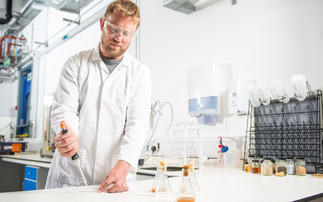14 green start-ups pitched a raft of exciting clean tech ideas to a host of investors at yesterday's BusinessGreen Technology and Investment Forum
It may be often said, but it always bears repeating: if the world is to stand any chance of averting dangerous climate change, then by around 2050, many if not all of the world's major economies will need to be fully decarbonised. That means within the next three decades - just one generation - pretty much every activity carried out in industrialised economies will have to result in net zero greenhouse gas emissions.
Now for some that may be a sobering thought, but for many in the green economy it also presents an exciting opportunity. After all, delivering a net zero emission economy requires the widespread rollout of a range of technologies that have only recently begun to scale up, as well as the delivery of many more which perhaps haven't even made it onto the drawing board yet.
It was enthusing, therefore, to see such a huge variation of innovative technologies and ideas with the potential to play key roles in that all-too-crucial economic transition on display at the BusinessGreen Technology and Investment Forum yesterday.
Held at the Future Cities Catapult near Farringdon in Central London and supported by Innovate UK, the event saw 14 clean tech entrepreneurs each given just four minutes to pitch their ideas to a host of investors in a bid to attract seed, early stage, and scale up funding to take their businesses to the next level.
From ultra-efficient electric powertrains and food waste apps, to floating river cycleways, office furniture refurbishments, and even carbon negative power generation: investors certainly had a huge range of innovations to consider.
But it wasn't just investors hoping to learn something - pitchers also got a turn, too. In a bid to lift the lid on precisely what entices investors to open their wallets, three leading sustainability investors sat down for a panel discussion in a role-reversal of sorts which saw them take questions from the entrepreneurs. Lucy Rands, investment associate at ETF Partners, Andrew Wordsworth, founder and managing director of Sustainable Ventures, and Jim Totty, managing partner at Sustainable Technology Investors, all offered their insights into what makes a compelling pitch.
"There is a lot of money to be made, as well as making a positive impact," said Rands of investing in the green economy, adding that: "We pride ourselves in people first, so we would turn down a good company if we didn't get on with them."
But she emphasised, of course, that investing out of charity and goodwill was never an option. ETF Partners, Rands said, was "first and foremost a financial fund" stressing the companies it invests in must always clearly demonstrate a viable business model and how they can bring financial returns.
Moving on to common pitching pitfalls, there was a 'tumbleweed moment' when the panel was asked whether they had ever been blown away by a pitch from an innovator, but they suggested that even in a bad pitch, it is possible for a good business head and passion for the project to shine through.
Rands said entrepreneurs too often overestimated investors' knowledge and understanding of a technology or market, sometimes launching straight into complex technological explanations without first spelling out the basics.
"I've been in long meetings with pitches for an hour or so, and I still don't understand what they [the pitchers] are doing," she said. "You have to be able to articulate what you're doing to a teenager."
Wordsworth, meanwhile, pointed to the importance of entrepreneurs being "very, very clear about what you think your target market is", as investors will immediately see the risk in a technology where it is not immediately clear who will need it.
"If you can't [explain the target market] it probably means you don't understand your customers," he explained. "You have to show you've talked to them and understand what they are doing."
Indeed, the panellists were keen to highlight how pitchers needed to be as cognisant of the risks investors are taking, often with other people's money.
Totty pointed to a failure to fully understand the possible political and regulatory risks that could lie ahead for a technology or business as one of the most common pitfalls for up and coming entrepreneurs. For example, he highlighted the government's sudden decision to cut the Feed-in Tariff for solar PV in 2015, a move which hit the industry - at the time strongly reliant on subsidy support - very hard.
"I think the lesson is to really understand those regulatory risks and decide whether you want to expose capital and potentially your business to it, or not," he said. "That's the key decision to be made."
He also warned that too many early stage companies fail to accurately map out their future capital requirements and as such are often guilty of under-estimating the level of investment they will need to scale up.
Then it was the pitchers turn to take to the stage. The main event saw each of the 14 impressive pitches sticking doggedly to the four minute rule, before taking several questions from the investors in the audience.
First up, Arcola Energy's Richard Kemp-Harper set out his case for fitting commercial vehicles with hydrogen fuel cell powertrains, arguing his company's technology offers the most cost-effective means of delivering zero emission heavy goods transportation. Combatting air pollution is of course crucial, and whereas batteries are an increasingly popular means of powering passenger cars, hydrogen fuel cells provide the greater payload necessary to support heavier road vehicles, he contended.
Further demonstrating the increasingly popular shift towards e-mobility on the roads, Meteor Power's lightweight, removable battery innovation is aimed at last mile deliveries, such as e-scooters, and is capable of charging up at twice the speed of a Tesla. What's more, investors learned, the company boasts former superbike champion Carl Fogarty as its brand ambassador.
Later, pitching EV Driver's model for an agnostic, pay-as-you-go electric car charging tariff without subscription fees, Charlie O'Donoghue - who is in charge of the firm's technical development - argued the case for a new kind of public charging network. "We facilitate charging, we don't control it," he explained.
But it wasn't only road transport solutions on show. Signol's data analysis system has already been tried and tested on Virgin flights, delivering significant fuel, cost and emissions savings by encouraging simple pilot behavioural changes both on the runway and in flight. With emissions from international aviation a major challenge for the industry, the firm's innovative 'nudge' based approach could well prove crucial - and lucrative - according to the firm's pitch.
Back on the ground, meanwhile, the River Cycleway Consortium's idea to develop a floating pathway along the Thames for cyclists and walkers to safely and pleasantly travel about town promised to encourage more active and low emission travel in the UK capital.
Elsewhere, Immaterial's COO Ben Swan did a fine job of explaining complex scientific principles which he said enabled the manufacture of porous 'metal organic frameworks' that could be used for a broad range of applications and industries, including far more efficient, cost effective, and environmentally beneficial transportation and storage of natural gas.
And, with the race still very much ongoing to find a viable means of capturing, storing or utilising carbon emissions, Origen Power's CEO Nicky Chambers' pitch to generate power while taking CO2 out of the atmosphere to produce lime as a byproduct commodity felt like an exciting prospect. "We believe in the future all electricity will be made this way," she said.
But if there was any trend to proceedings, it may perhaps have been building energy efficiency. Buildings represent a huge chunk of the world's emissions, yet to date the sector has been woefully underserved by both ambitious policies and technology innovations. Thankfully, there were plenty of potential solutions on show yesterday, not least Demand Logic's low cost, web-based, easy-to-install system which allows users to view and aggregate live heating and ventilation data to better optimise their use to boost efficiency savings. LightFi's innovation, meanwhile, fits into a plug socket and allows building mangers to instantly detect the number of occupants in a room, making it much easier to optimise heating and ventilation. Then there was Grid Duck's innovation which - focused more at facility managers and energy consultants - offers wireless efficiency and flexibility to control and analyse energy consumption.
But efficiencies and cost savings can also be gleaned from applications on the outside of a building, as Senergy's 100 per cent polymer plastic solar thermal panels showed. Cheaper to manufacture and install than metallic panels, the firm claims the panels make it affordable to generate energy to feed into a building's hot water, heating, refrigeration and cooling supply, as well as being able to store excess energy at hotter times of the year.
Other exciting innovations on show included Gravitricity's plan to utilise old mine shafts to store energy from the grid - an idea which has picked up press coverage lately - and Rype Office's impressive process for refurbishing and remanufacturing used office furniture so as to deliver office upgrades at a fraction of the cost of purchasing new chairs and desks.
Finally, Yellow Label's app promises to enable users to view reduced to clear food items in supermarkets at the touch of a button, helping to reduce food waste, boost retail sales, and save consumers money.
Although differing in size, experience and solutions, each pitcher - as with many more budding green entrepreneurs out there - will now be hoping to attract the funding needed to scale up their businesses. It will certainly be fascinating to watch the journey these entrepreneurs take next, as they look to help the world inch slightly closer to its net zero carbon goal.
The full list of companies presenting at the forum is available here.
The BusinessGreen Technology and Investment Forum was hosted in association with Innovate UK, Clean+Cool and Investment Week.










